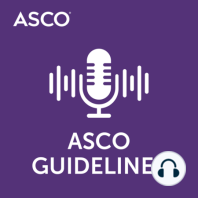15 min listen
Use of Endocrine Therapy for Breast Cancer Risk Reduction Guideline
FromASCO Guidelines
ratings:
Length:
15 minutes
Released:
Sep 3, 2019
Format:
Podcast episode
Description
An interview with Dr. Kala Visvanathan from Sidney Kimmel Comprehensive Cancer Center, and Johns Hopkins Bloomberg School of Public Health on the guideline update. This update adds anastrozole to the options of pharmacologic interventions for breast cancer risk reduction based on recent practice changing data. Read the full guideline at www.asco.org/breast-cancer-guidelines. TRANSCRIPT Hi. My name is Clifford Hudis, and I am the CEO of the American Society of Clinical Oncology as well as the host of the ASCO in Action podcast. About twice a month, I interview thought leaders in health care and experts in oncology. And we provide analysis and commentary on a wide range of cancer policy and practice issues. You can find the ASCO in Action podcast on Apple Podcasts or wherever you are listening to this show. And you can find all nine of ASCO's podcasts, which cover a wide range of educational and scientific content and offer enriching insight into the world of cancer care at podcast.asco.org. The purpose of this podcast is to educate and to inform. This is not a substitute for professional medical care and is not intended for use in the diagnosis or treatment of individual conditions. Guests on this podcast express their own opinions, experience, and conclusions. The mention of any product, service, organization, activity, or therapy should not be construed as an ASCO endorsement. Hello, and welcome to the ASCO Guidelines Podcast series. My name is Shannon McKernin, and today I'm interviewing Kala Visvanathan from the Sidney Kimmel Comprehensive Cancer Center, Johns Hopkins School of Medicine, and Johns Hopkins Bloomberg School of Public Health, co-first author on "Use of Endocrine Therapy For Breast Cancer Risk Reduction: ASCO Clinical Practice Guidelines Update." Thank you for being here, Dr. Visvanathan. Thank you as well for having me. So can you tell us about the phase III randomized trial, which provided the signal for this update? Yes. This was the IBIS-II trial that was reported out by Cuzick, et al in 2014. It was a double-blind, randomized placebo-controlled trial that assessed the safety and efficacy of Anastrozole, the aromatase inhibitor Anastrozole, at 1 milligram per day for five years. And the primary endpoint was the reduction of the incidence of breast cancer in postmenopausal women at increased risk of developing breast cancer. The trial itself was reported out with a median follow up of five years and the intention-to-treat analysis actually revealed that 85 women in the placebo group and 40 women in the Anastrozole group had developed both invasive and noninvasive breast cancer. What it showed was that there was a reduction in the incidence of breast cancer of 53% overall. It included both invasive and non-invasive breast cancer after a seven-year followup. And importantly, in subgroup analysis, similar to the other hormone endocrine therapy prevention trials, it also showed that the reduction in breast cancer risk among invasive cancers was limited to those individuals with ER-positive and PR-positive tumors. And the reduction in breast cancer incidence was among hormone-positive breast cancers. Another interesting point to mention here was that the five-year adherence was only slightly less in the Anastrozole arm compared to placebo. So it was well tolerated. And that was 68% in the Anastrozole group compared to 72% in the placebo group. And in all the subgroup analysis, there was no significant difference, except when they stratified by hormone replacement, women who had no prior hormone replacement, they saw a clear risk reduction. And this was not seen in women with prior hormone replacement therapy. And so what are the key recommendations for the update of this guideline? So based on these results, the update really adds Anastrozole as another option for endocrine prevention in women at increased risk. So specifically, we say that Anastrozole 1 milligram per day orally for five years should be discus
Released:
Sep 3, 2019
Format:
Podcast episode
Titles in the series (100)
Patient-Clinician Communication Consensus Guideline: An interview with Dr. Timothy Gilligan from Taussig Cancer Institute and Institute and the Center for Excellence in Healthcare Communication, Cleveland Clinic, Cleveland, OH on the guideline providing guidance to oncology clinicians on how... by ASCO Guidelines
